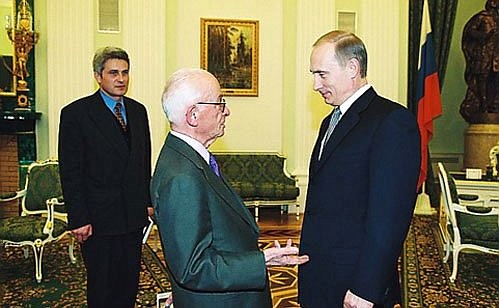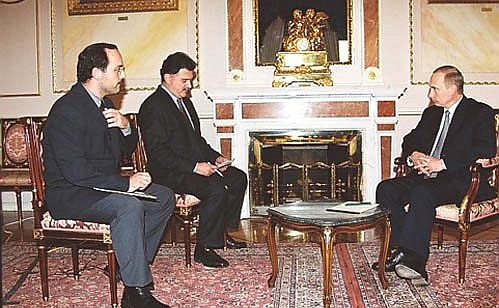Answering questions from the Greek newspapers Eleftherotypia and Vima, and the TV companies NET-TV and MEGA, the Russian President spoke about key international problems and bilateral Russian-Greek relations.
In the opinion of the Russian head of state, the main threat to the world community today is the possibility of chemical and biological weapons falling into the hands of terrorists, and not from intercontinental ballistic missiles, against which the United States intends to protect itself by setting up a national missile defense.
He said that all the necessary means– political, economic and, if necessary, military, if sanctioned by the UN, should be used to fight terrorism.
Mr Putin said the future of Europe depended on the creation of a collective security system on the continent capable of responding to the modern threats. Noting that Russia’s defence potential is fairly high, the President said that Russia was ready to make it part of the security system in Europe and the world. But he is convinced that mutual trust should be a key element in the new relations.
In the words of the Russian leader, Moscow, together with the leaders of NATO countries, was considering the possibility of changing the format of relations between Russia and NATO from “19+1” to “20”. The President said that if it happened the problem of NATO expansion would lose much of its relevance and urgency.
The President confirmed that he was pleased with the positive change in Russian-American relations. At the same time he admitted to differences over some issues.
Noting that the American plans to create a national missile defence would not affect Russia’s security, at least not in the next decade, Mr Putin stressed that the 1972 ABM Treaty was the cornerstone of international stability and security.
He said that Russia had enough weapons of a standard and quality that could pierce any national antimissile defence.
Mr Putin dwelled on the anti-terrorist operation in Afghanistan saying that it was not the only place where the fight against international terrorism was being waged because an arc of instability had been formed from the Balkans to the Philippines, in which the so-called terrorist international had been established.
Greek journalists also asked questions about Russia’s interests in the Balkans, its military presence in the Mediterranean, President Putin’s attitude to the US and NATO presence in Central Asia, his opinion about the changes taking place in Russia and the rest of the post-Soviet space, on the situation in Chechnya, and the outlook for economic ties between Russia and Greece, including the Burgas-Alexandroupolis oil pipeline.

